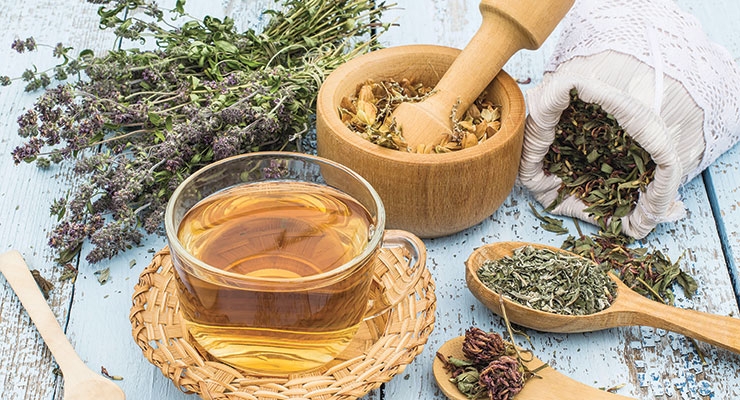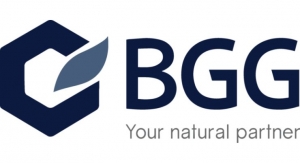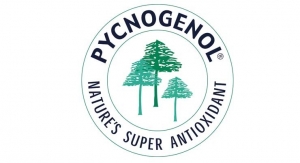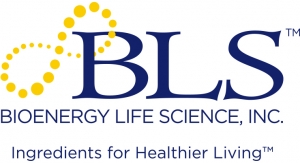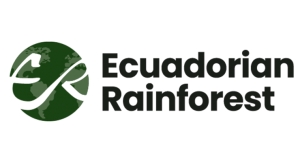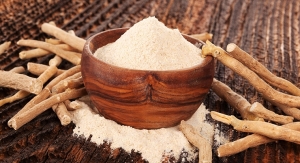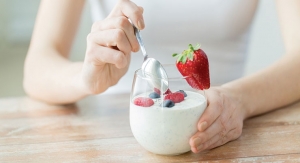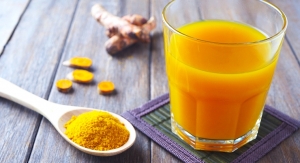By Lisa Olivo, Associate Editor07.02.18
Herbal/botanical supplements have long represented safe, natural, and cost-effective solutions for maintaining health and wellness. However, in 2015 when New York’s attorney general put the category under scrutiny, many questioned whether consumer trust was forever tarnished.
Despite bad press and increased governmental oversight, research suggests consumers continue to have a positive perception of herbs and botanicals. Survey data from the Natural Marketing Institute (NMI) showed that about three in 10 consumers believe in the importance of herbal supplements for maintaining their health. The 2017 insights from NMI also found 29% of consumers believe taking an herbal supplement is very/somewhat important for living a healthy lifestyle.
Continued sales growth is expected. Nutrition Business Journal (NBJ) estimated the herbs/botanicals industry would grow from $33 billion in 2016 to $38 billion by 2020, translating to year-on-year growth of about 3.5% (NBJ Global Supplement Report, 2016).
NMI suggested increased interest in herbal health solutions from millennials and gen Xers is propelling the category. These demographics are driving herbal supplement usage, with 19% of millennials and 19% of gen Xers reporting they used an herbal supplement in the last 30 days. Millennials are looking to natural herbs and botanicals for issues like sports nutrition (performance and recovery), headaches, anxiety, stress, mood/depression, and detoxification, according to NMI; while gen X herbal supplement users are seeking support with menopausal issues, sexual dysfunction, sports/performance/recovery, asthma, and weight loss.
Sébastien Bornet, vice president of global sales & marketing at Switzerland-based Horphag Research, believes millennial purchasing power will continue to propel sales of herbal and botanical supplements. “Reports [such the CRN Consumer Survey on Dietary Supplements] show that nearly 70% of millennials use nutritional supplements on a regular basis and there’s an ongoing focus on natural products with clean labels,” he observed. “This expanding marketplace has created more demand for quality ingredients that are backed by science to support their claims. Consumers overall are doing their own research on products and ingredients that support their needs and they’re interested in ingredients that have evidence of efficacy and safety.”
Category Challenges
While consumer usage, acceptance, and trust of herbal supplements remains high, the category has faced challenges in recent years. An evolving regulatory landscape, and increased government and consumer demands for transparency and scientific validation, are among the underlying issues impacting the category.
Brien Quirk, director of R&D for Draco Natural Products, San Jose, CA, pointed to adulteration as well as the need for identity testing, “especially for mixed botanical formulations—a gray area when it comes to a botanical being GRAS or not, efficacious, and safe”—as particularly weighty issues for companies in the herbal industry.
Inconsistencies between global regulatory standards can also be problematic. “Some botanicals that are foods in China or other countries may not be as readily recognized by FDA as being foods in the U.S.,” explained Mr. Quirk. As an example, he pointed to the herbs astragalus and dong quai, which are commonly added as flavors to chicken stews in China. In the U.S., however, these would not be considered culinary herbs by FDA. “These herbs may have effects on blood clotting and people on blood thinners could have adverse effects, however, so could many foods that are not restricted such as onions, garlic, green tea, grape juice, grapefruit, and many others,” noted Mr. Quirk. “So there seems to be a double standard or excessive, unwarranted fear.”
Shaheen Majeed, president-worldwide for Sabinsa Corp, East Windsor, NJ, said standardization is a primary obstacle within the herbal category. “The secondary metabolites present in the plant may vary from season to season, place to place, time of collection, and age of the plant, method of preparation, etc.,” he explained. “For example, vasicine content in Adhatoda vasica leaves is highest during summer and low during monsoon. So standardization plays an important role in ensuring a product has consistent components in different lots.”
The fact that herbs and botanicals are natural, raw ingredients means product yield and quality can be impacted by the unpredictability of Mother Nature. Alison Raban, certified food scientist, BI Nutraceuticals, Rancho Dominguez, CA, cited issues such as “rainfall, crop availability, and the variability of microorganisms in different geographic regions” as factors that can cause problems for “unsophisticated suppliers trying to provide quality product on a consistent basis.”
Contamination of plants with things such as heavy metals, pesticides, mycotoxins, polyaromatic hydrocarbons (PAH), and microbes is also a primary concern, particularly as consumers and regulators alike are demanding safer products. Mr. Majeed stressed that one of the major obstacles for the herbal industry is to control these parameters in the final product. “Careful sourcing of raw material plays a role in mitigating this challenge, as does competent purity testing.”
While the traditional, longstanding use of herbal ingredients is an important reason consumers are attracted to products, modern scientific validation is still needed to verify safety and efficacy. “Herbal usage is based on traditional knowledge, often ancient knowledge such as the Indian system of Ayurveda, Traditional Chinese Medicine, Tibetan medicine, etc.,” noted Mr. Majeed. “The safety and potential toxicity needs to be, and often has been, evaluated by modern scientific methods. Additionally, research can sometimes uncover health benefits previously unknown, something Sabinsa has experienced several times.”
Of course, adulteration—particularly economically-motivated adulteration by bad actors in the industry—is cause for concern for consumers and reputable suppliers. Herbal powders can look very similar to the untrained eye, leaving the door open for unscrupulous suppliers. “Although a few boutique herbal products companies work with raw herbs, the majority of the ingredients used in the herbal industry are in dried form,” explained Mr. Majeed. “One powder looks very much like another, making adulteration a risk. For example, black pepper can be easily adulterated with papaya seeds.”
In recent years, Sabinsa has been a vocal advocate against adulteration in the curcumin market, calling out some products on the market that were adulterated with unlabeled synthetics. “Synthetic curcumin is made from petroleum-based materials in which radiocarbon is totally absent, unlike plant-derived material where a definitive amount is present,” Mr. Majeed explained. “Testing methods such as Accelerator Mass Spectrometry can accurately assess the content of radiocarbon in a sample and can readily distinguish between a natural sample and its synthetic version. It can even determine the extent or degree of synthetic contamination in a professed natural product when both the natural and synthetic products are mixed (a common practice to offer cheap material).”
Misinformation is also a major hurdle in this category, according to Ramon Luna, marketing coordinator for Ecuadorian Rainforest, Belleville, NJ. Consumers are looking for honest marketing when seeking botanical supplements, he said, urging companies to respond in kind. “It hurts the industry’s reputation as a whole when misleading information is used to push sales of products. One of the best opportunities available now are for companies who put their products through rigorous testing to show how effective they really are. We see a few notable manufacturers already doing this, and this has helped them build up consumer trust.”
Herbal Opportunities
By addressing these issues, leaders in the herbal industry have made great strides toward improvement, leading to innovation and opportunity.
“The recent initiatives by regulatory bodies and quality-conscious brands focusing on identity testing, traceability, and sustainable sourcing of raw materials are providing huge opportunities for responsible suppliers focused on manufacturing under strict quality controls of their standardized extracts and botanicals,” commented Bhavprita Harshawardhan, general manager for strategy and marketing, Specialty Botanicals & Extracts, OmniActive Health Technologies Ltd., Morristown, NJ.
She pointed to the growing global trend toward usage of organic products; emerging spending power in BRIC countries; and herbal application in foods and beverages as key prospects.
Bruce Brown, president of New Brunswick, NJ-based Natreon, Inc., also cited consumer demand for natural, organic, and non-GMO as “great opportunities” within the herbal supplement category, as “herbs/botanicals successfully meet many of the consumer preference trends rather than the synthetic ingredients.” He added that these ingredients also have a compelling story to tell consumers, when demonstrating transparent ingredient sourcing, and “a clean supply chain from farm to bottle.” Scientific advancement with regard to standardizing levels of bioactives is also a positive step for the category, according to Mr. Brown, which will serve to “further illustrate the proven health benefits that have been studied for centuries in practices such as Ayurveda.”
Scott Chen, vice president of Jiaherb, Inc., Pine Brook, NJ, said customers are now demanding botanical identification testing, a change which ultimately benefits the industry. However, he stressed that proper identification of herbal formulas can be a complex undertaking. “Herbs are so complicated,” he noted, “and we need to find the right way to test each herb and species. You can send one sample to four different labs and can get four different results.” He urged companies to seek out the proper analytical testing methods, rather than blindly approach identity testing as a “one size fits all” endeavor.
Mr. Chen added that more food and beverage companies are looking for herbal ingredients, specifically from companies offering safe products with improved solubility. “More customers are looking for organic or non-GMO material, which means the consumers are looking for better, cleaner ingredients,” he added. “Demand for organic material has significant potential to grow looking ahead.”
A revitalized incentive toward testing and scientific validation is spurring new company initiatives and partnerships. For example, Indena S.p.A.—a company that specializes in the identification, development, and production of active principles derived from plants—joined forces with Hyris (a privately held, U.K.-based biotechnology company) and NHP Research Alliance to sign a strategic cooperation agreement in 2017 for the joint development of DNA authentication test kits for botanicals and related natural health products.
Indena provides standard plant reference materials that include preparation of herbarium vouchers with ancillary information from the Indena supply chain; professional taxonomic IDs; genome scans (DNA sequences) for multiple populations to identify unique nucleotide signatures; nuclear magnetic resonance (NMR) for a chemical fingerprint; image scanning of samples; and a bioinformatics database archive with online access. Meanwhile, the patented Hyris platform offers the unique capability to perform full genetic analysis of biological samples in any kind of setting.
Sabinsa has created its own contract farming program to supply authentic, high-quality, and low-contaminant raw materials for its most in-demand ingredients. “We have multiple manufacturing facilities with capabilities ranging from continuous extraction to supercritical fluid extraction to ensure consistency,” explained Mr. Majeed. “Sabinsa’s state-of-the-art analytical testing facility checks for identity and purity, using LCMS, LCMSMS, GCMS, GCMSMS, ICPMS, polarized microscopy, HPTLC, etc. Sabinsa conducts so many clinical studies that we now have a subsidiary company that manages them for us and other companies, Clinworld, for various ingredients in India, the U.S., Japan, and Canada.”
BI Nutraceuticals offers its Identilok program, (established in 1996), which is an orthogonal (macroscopy, microscopy, sensory, HPTLC, HPLC) trade-marked ID testing program. “Identilok was and still is the most advanced and comprehensive authentication program, utilizing the latest technologies; most recently, DNA verification. In 2002, we developed Protexx HP Green Steam sterilization long before the elimination of Ethylene Oxide and irradiation techniques by the Food and Drug Administration. As the original promoter of kill step validation in the industry, Protexx HP Green Steam sterilization became the industry’s first species-specific organic sterilization method with a validated kill step.”
Ultimately, Mr. Majeed believes the challenges in the herbal marketplace have elevated the category. “With challenges to surmount comes opportunity. Knowing what the challenges may be sets a road map for doing things really, really well to ensure safe and effective products.”
Top Crops
Discussing the leading herbal ingredients in the category, Ms. Harshawardhan with OmniActive cited data from the American Botanical Council (ABC), which listed horehound, cranberry, echinacea, garcinia, green tea, black cohosh, flaxseed and/or oil, ginger, valerian, and turmeric as the top herbal supplements in the U.S. in 2016.
Turmeric (Curcuma longa) in particular has ascended to mainstream success in recent years. Indena’s Marketing Director Cosimo Palumbo forecasted that turmeric would continue to be “a hero in the dietary supplement category for years to come.” Surging popularity among consumers, in addition to emerging scientific research, particularly in the areas of inflammation, brain, and gastrointestinal health, will continue to propel turmeric to success, he said.
Draco’s Mr. Quirk suggested turmeric would continue its rise to prominence as aging baby boomers seek out natural, clinically validated solutions for supporting health issues like joint and brain health.
Recently, independent researchers at Tufts University and Tohoku University published a study in Nutrition & Metabolism that found mice fed a high-fat diet supplemented with a curcumin-piperine combination (Sabinsa’s Curcumin C3 Complex and BioPerine, a black pepper extract for bioavailability) contributed to caloric restriction for the prevention of metabolic syndrome. Researchers observed that “the combination of curcumin and piperine maintained the telomere length, loss of fat, and certain inflammatory cytokines,” explained Mr. Majeed. “Data indicated the combination of curcumin-piperine significantly reduced the total body fat, reduced cellular aging (preserving telomere length), and enhanced the caloric restriction effects for the prevention of metabolic syndrome.”
Turmeric, along with other culinary herbs such as “ginger, cinnamon, and pepper, have also been associated with providing overall health benefits,” noted BI Nutraceuticals’ Ms. Raban. She pointed to the popularity of dietary supplements and functional foods and beverages with familiar, naturally beneficial ingredients. “These spices hit that sweet spot for consumers looking for added health, but may be a little wary to try something completely unknown.”
Mr. Quirk also pointed to “ginger for joint and digestive health, beets for nitric oxide upregulation and endurance in sports nutrition, and mushrooms such as reishi for immune enhancement” as food-based botanicals offering consumers scientifically backed health benefits from ingredients they can easily understand.
“For brain neuroprotection and memory benefits, fermentation of some medicinal herbs can create new and useful therapeutic results,” noted Mr. Quirk. A 2016 study examining supplementation with reishi water extracts fermented by lactic acid bacteria demonstrated its effect in significantly enhanced learning memory and cognitive function in scopolamine-induced rats in passive avoidance tests. “Cholinergic activity in the brain was improved by reducing the activity of the enzyme acetylcholinesterase which breaks apart acetylcholine.”
The herb ashwagandha offers many health benefits, including anti-stress, cognition, ergogenic, joint, and cardiovascular health support, according to Mr. Brown of Natreon. Further, he noted the body of science supporting ashwagandha continues to grow, linking the herb to “key health categories such as sports nutrition, nootropics, and adaptogens.”
Consumer trends favoring “back to basics” nutritional ideals are leading more people to traditional ingredients such as ashwagandha, which has been used in Ayurvedic medicine for thousands of years. With longstanding use in Eastern medicine, Mr. Brown said Western culture customers are beginning to understand the adaptogenic benefits of ashwagandha in their daily routine. “Ashwagandha with high levels of withanolide glycosides are shown to enhance the balance between mind and body. Consumers are also seeking products that provide experiential effects and don’t have the negative side effects such as caffeine.”
A randomized, double-blind, placebo-controlled, parallel-group clinical trial studied the effects of different doses of Sensoril ashwagandha on the sports performance of 66 healthy and recreationally active male participants between ages of 18 to 45, with researchers finding significant benefits for sports performance and recovery. “Initial results found significant improvements in the Sensoril group for numerous sports performance measures, including 1-repetition maximum squat, peak power bench, peak power squat and repetitions-to-failure on the bench press,” noted Mr. Brown. “It also showed an improvement in subjects’ perceived recovery score.”
Amla also has ancient roots in Ayurveda. “Amla is an antioxidant-rich superfruit that has been used in Ayurvedic medicine for thousands of years to treat various health conditions,” noted Mr. Brown. “It is clinically proven to improve lipid profile by increasing HDL cholesterol and reducing LDL cholesterol. It also benefits endothelial function, reduces biomarkers for oxidative stress, and inhibits platelet aggregation.” Additionally, amla has been found to support healthy blood glucose levels, and offer protection from gastrointestinal disorders.
Boswellic acids from Boswellia serrata have been linked to the modulation of inflammation in the gut, said Mr. Palumbo. “In fact, when formulated as Phytosome (as Casperome) recent studies demonstrated a modulation of the level of calprotectin (the GI inflammatory marker) as well as the reduction of symptoms associated with mild Irritable Bowel Syndrome.” He suggested the ingredient has broad application within the GI category, with potential for combination formulas with digestive enzymes and probiotics.
The antioxidant benefits of Pycnogenol French maritime pine bark extract have been studied in numerous clinical trials, with one recent study finding the ingredient provides support for health during travel.
Published in Minerva Cardioangiologica, scientists examined 295 participants at varying risk levels for thrombosis, flying in economy class twice a week for more than eight hours. Individuals supplemented with 150 mg of Pycnogenol daily during the three days leading up to their travel, and the three days after, experienced a significant reduction of edema in the lower legs and ankle circumference compared to control groups; and a decrease in reported leg pain after flights. In addition, those supplemented with Pycnogenol showed notable improvement in sleep quality, enhanced synchronization, reduced fatigue, improved vison, and better cognitive function.
Robuvit, Horphag’s French oak wood extract, has recently been validated for assisting recovery following influenza. A study published in the Journal of Sports Medicine and Physical Fitness found participants over the age of 65 supplemented with 300 mg of Robuvit daily for three weeks once flu symptoms ended experienced 39% greater post-flu strength than control groups. After three weeks, participants who supplemented with Robuvit reported increased post-flu strength, boosted recovery after exerting effort, significantly improved attention span, enhanced sleep quality, and improved working and concentration capacity.
Mr. Luna of Ecuadorian Rainforest said jiaogulan (Gynostemma pentaphyllum) is one of the most prominent herbs at the moment. “A popular herb in China, jiaogulan has started to become very popular in consumer products. Many in Asia use jiaogulan because it is an adaptogen, a term used for herbs believed to be useful against stress.” He believes consumers are looking to jiaogulan for support “due to how hectic life has become and are looking for a natural way to unwind at the end of the day.” Jiaogulan is also believed to be a good source of antioxidants, he said.
Sabinsa’s Mr. Majeed also noted Curcuma longa and Boswellia serrata among the top herbal ingredients in the market, in addition to “ginger (Zingiber officinale), for digestive, anti-inflammatory, and joint support; holy basil (Ocimum sanctum) for blood sugar support, rejuvenation; black pepper (Piper nigrum), a bioavailability enhancer; ashwagandha (Withania somnifera), an adaptogen; Coleus forskolhii for weight management support; coconut (Cocos nucifera), a nourishment factor for sports drinks, rehydration; and Pterocarpus marsupium for blood sugar support.”
Emerging Ingredients
As millennials seek out herbal supplements to target stress, mood, and mental health, Mr. Quirk with Draco pointed to ingredients such as “white peony for stress, sleep and cognitive health; and polygala for mood and cognitive” as herbs to watch in the future. Additionally, he suggested “fermented botanical extracts for enhanced bioactivity, metabolites, solubility, and absorption” would be up-and-coming in the category, adding that Chinese herbs “represent a relatively untapped frontier of new and exciting wellness supplements for the mainstream market.”
BI Nutraceuticals’ Ms. Raban said botanicals such as “matcha green tea, Indian gooseberry, acerola, milk thistle, and floral botanicals like chamomile, hibiscus, and rose” are promising ingredients to “keep an eye on.” While she noted these are not necessarily “new” ingredients, the familiarity of these herbs and botanicals could lead to easy adoption among consumers.
“An ingredient coming up in the ranks is longjack (Eurycoma longifolia), also known as tongkat ali,” according to Mr. Luna of Ecuadorian Rainforest. “Longjack is an herb indigenous to Southeast Asia and is believed to be an ergogenic aid. It is because of this that there seems to be a rise in longjack’s use in sports supplements. As word of this herb gets out, it may very well be the next big hit ingredient in the sports supplementation industry.”
Another rising star in the sports nutrition category is shilajit, a humic substance from the Himalayan mountains. “This Ayurvedic super ‘rasayana’ (rejuvenator) has been used as an anti-aging agent for thousands of years,” noted Mr. Brown of Natreon. “Recent research backed by two clinical studies from Ohio State University Wexner Medical Center found that a standardized extract of shilajit significantly upregulates several collagen and other extracellular matrix genes. Two other clinical studies have shown that shilajit increases testosterone levels and exercise performance.” He added, “in a couple of years, we think it will be a $100 million ingredient.”
Formulation Trends
Formulating with herbs and botanicals takes careful consideration, depending on the active ingredient, and what demographic manufacturers are trying to reach. “All the ingredients cannot be supplemented in the same dosage forms,” cautioned Mr. Majeed. “Because of their incompatibility with other ingredients, bitterness, and hygroscopic nature, the delivery system can be challenging for the herbal formulation industry. Skillful formulation by people with herbal experience is key.”
Furthermore, consumer demand for clean label is also impacting formulations. “Similar to food, a lot of supplement consumers are looking at clean label solutions when shopping,” said Ms. Raban. “A subset of that trend specific to supplements is the idea of whole food nutrition; this may make formulating a little more complicated but it provides plenty of marketing potential.” She pointed to key examples of formulation and delivery formats catering to consumer demand for clean label, including “vegetarian capsules, label-friendly excipients, using natural colors or flavors, and natural sources of vitamins and minerals.”
New formulation trends are driven in part by the need to develop new products for demanding consumers, said Mr. Palumbo. “Millennials, for example, have full access to information, which allows them to make informed decisions. Their main concerns about quality, safety, and the environment lead to a demand for formulations characterized by a great attention to quality of raw materials, demonstration of product safety and efficacy, accurate labeling of products, and company policies in terms of sustainability and environmental protection.” He added that formulations based on natural, botanical-based ingredients, backed by strong scientific evidence are the gold standard, and are seen as “synonymous with quality.”
However, it’s not just clean label and strong scientific credentials they want. “Millennials also look for formulations able to maximize actives absorption, reducing dosages and number of administrations,” while also maintaining a natural profile, said Mr. Palumbo.
Botanical formulations have traditionally come in tablet or capsule form, noted Ms. Harshawardhan with OmniActive, yet recently, “with a bid to differentiate themselves from the competition, a large focus has been placed on alternative delivery formats.” This differentiation first began with trending softgel formulations, and then quickly transitioned to “powder sachets for dosed consumption or beverages, then on to RTDs, gummies, chews, gel packs, and so on.”
Simultaneously, she observed a movement toward botanical usage in functional foods and beverages. ”We are beginning to see a deep integration of these markets, with new opportunities for customers to bring novel innovation and differentiation.”
For several decades, Mr. Majeed said the typical dosage form for herbal products was powders, multi-powder mixes, teas, tinctures and oils, without a strong prioritization of standardizing ingredients. “At present, though, the majority of herbal ingredients are in standardized extract form and can be quantified,” he said. “Delivery form options have broadened; supplements can be in the form of tablets, bilayer tablets, capsules, softgels, lozenges, dispersible tablets, granules, ready-to-drink powders, gummies, and even added to functional foods and beverages. Formulation is based on the nature of the ingredient and the delivery target.”
Testing Demands
Testing labs have always played a key role in verifying identity, potency, and purity of herbal products, recounted Mr. Majeed, but today “fit for purpose” testing is a “much more visible component in demonstrating quality.”
“Long gone are the days when a brand would accept a copy of a copy of a Certificate of Analysis (CoA) to verify an ingredient, and we’re glad,” Mr. Majeed continued. “While tried and true methods of identity validation are in common use, sometimes situations call for bringing new test methods into use. After Sabinsa discovered the synthetic curcumin adulteration problem, we instituted a policy of radio carbon testing for each lot of Curcumin C3 Complex so our customers have that documentation from us proving they are getting an ingredient derived from turmeric, not petroleum.”
He added that many well-known manufacturers and suppliers undergo third party auditing through organizations such as NSF International, USP, and UL. “While these are paid certifications, the upkeep of the GMP discipline must be maintained since we are watched closely by U.S. FDA.”
Increasingly, the industry is seeing customers exercise audits of manufacturing operations, supply chains, and quality systems to reaffirm their faith in their products and suppliers, noted Ms. Harshawardhan. “This has a cascading impact on all steps of the value chain and demands processes and documentation to establish traceability and quality at each stage. While the prequalification to be an ingredient supplier is FSMS/GMP certification, most manufacturers do facility audits of ingredient suppliers as well. Responsible, value-added ingredient suppliers are proactively striving to meet the quality and safety benchmarks set by regulatory bodies by voluntarily being audited for certifications and re-certifications.”
Identity testing, toxicological literature reviews, as well as testing for heavy metals and pesticides, are all key ways responsible suppliers are protecting consumers, Mr. Quirk of Draco explained. “It is vital for customers to know that when they test extracts according to the GMP law, 21 CFR 111, that they can be confident the herbs will pass all of the tests as listed on a supplier’s CoA. We provide voucher samples of raw herbs for the representative extracts in some instances when there is difficulty in confirming identity testing results. Draco has also assisted supplement companies by providing test methods to confirm the CoA results.”
Executive Vice President of Jiaherb Chris Oesterheld, said this level of rigorous self-examination in the industry isn’t exactly new, but companies are now publicizing their efforts as a marketing strategy. “Many manufacturers of natural ingredients such as Jiaherb have always had control of the raw materials they source in order to produce finished extracts and powders. In recent years though, there has been more of a push from the industry to market these processes and be more transparent with our customers and thus the consumer.”
In response to this industry imperative, Jiaherb developed its HerbaLink chain-of-custody program, offering transparency in product identification and traceability. Mr. Oesterheld said such programs “have been launched to accurately depict the complexities of manufacturing botanicals, and all the variables we face from product to product.”
While most plants can be identified using macroscopic and microscopic analysis, Mr. Palumbo said, in some cases, it is necessary to resort to DNA-based methodologies to precisely define the identity at the species or variety levels. “In fact, for plants there is no universal DNA barcoding methodology and the choice of a technique depends on many factors,” he explained. “Each plant needs a dedicated method, developed on its own genome.”
While DNA-based identification technologies are contributing decisively to the authentication of botanicals, he said DNA testing is not the only, or even most accurate way for identification. He said DNA-based identification can complement the “chemotaxonomic and metabolomics analytical methods, but they must be part of a complete quality testing toolbox, which constitutes a reliable authentication platform.”
The most important consideration, he said, is “gaining knowledge in plant genetic diversity, as the DNA genomic data available in the GenBank public database are not checked for their origin. As a consequence, successful development of DNA-based authentication tools for plants and botanicals of unknown origin would require the creation of ‘reference’ DNA profiles, which would be shared and validated by the whole scientific community. These ‘reference’ DNA profiles should derive from the analysis of plant samples of known, certified origin (herbarium, taxonomically identified samples). Based on this assumption, it is of paramount importance to have ‘certified’ pure samples in order to derive reference DNA sequences to use to analyze DNA data.” Yet, he lamented, the botanical extracts industry does not have any such assurance.
To combat this shortcoming, Indena began integrating DNA sequencing into its quality system in 2011, putting together a precise database for starting materials since then. “Throughout its history of almost 100 years, Indena has been mapping the genetic identity of the raw materials used for its botanical extracts,” said Mr. Palumbo. “As no universal genomic ID method is available, this knowledge has allowed Indena to develop species-specific DNA identification analytical tools. As part of its quality system, Indena is able to apply the appropriate technology to each case.”
Despite bad press and increased governmental oversight, research suggests consumers continue to have a positive perception of herbs and botanicals. Survey data from the Natural Marketing Institute (NMI) showed that about three in 10 consumers believe in the importance of herbal supplements for maintaining their health. The 2017 insights from NMI also found 29% of consumers believe taking an herbal supplement is very/somewhat important for living a healthy lifestyle.
Continued sales growth is expected. Nutrition Business Journal (NBJ) estimated the herbs/botanicals industry would grow from $33 billion in 2016 to $38 billion by 2020, translating to year-on-year growth of about 3.5% (NBJ Global Supplement Report, 2016).
NMI suggested increased interest in herbal health solutions from millennials and gen Xers is propelling the category. These demographics are driving herbal supplement usage, with 19% of millennials and 19% of gen Xers reporting they used an herbal supplement in the last 30 days. Millennials are looking to natural herbs and botanicals for issues like sports nutrition (performance and recovery), headaches, anxiety, stress, mood/depression, and detoxification, according to NMI; while gen X herbal supplement users are seeking support with menopausal issues, sexual dysfunction, sports/performance/recovery, asthma, and weight loss.
Sébastien Bornet, vice president of global sales & marketing at Switzerland-based Horphag Research, believes millennial purchasing power will continue to propel sales of herbal and botanical supplements. “Reports [such the CRN Consumer Survey on Dietary Supplements] show that nearly 70% of millennials use nutritional supplements on a regular basis and there’s an ongoing focus on natural products with clean labels,” he observed. “This expanding marketplace has created more demand for quality ingredients that are backed by science to support their claims. Consumers overall are doing their own research on products and ingredients that support their needs and they’re interested in ingredients that have evidence of efficacy and safety.”
Category Challenges
While consumer usage, acceptance, and trust of herbal supplements remains high, the category has faced challenges in recent years. An evolving regulatory landscape, and increased government and consumer demands for transparency and scientific validation, are among the underlying issues impacting the category.
Brien Quirk, director of R&D for Draco Natural Products, San Jose, CA, pointed to adulteration as well as the need for identity testing, “especially for mixed botanical formulations—a gray area when it comes to a botanical being GRAS or not, efficacious, and safe”—as particularly weighty issues for companies in the herbal industry.
Inconsistencies between global regulatory standards can also be problematic. “Some botanicals that are foods in China or other countries may not be as readily recognized by FDA as being foods in the U.S.,” explained Mr. Quirk. As an example, he pointed to the herbs astragalus and dong quai, which are commonly added as flavors to chicken stews in China. In the U.S., however, these would not be considered culinary herbs by FDA. “These herbs may have effects on blood clotting and people on blood thinners could have adverse effects, however, so could many foods that are not restricted such as onions, garlic, green tea, grape juice, grapefruit, and many others,” noted Mr. Quirk. “So there seems to be a double standard or excessive, unwarranted fear.”
Shaheen Majeed, president-worldwide for Sabinsa Corp, East Windsor, NJ, said standardization is a primary obstacle within the herbal category. “The secondary metabolites present in the plant may vary from season to season, place to place, time of collection, and age of the plant, method of preparation, etc.,” he explained. “For example, vasicine content in Adhatoda vasica leaves is highest during summer and low during monsoon. So standardization plays an important role in ensuring a product has consistent components in different lots.”
The fact that herbs and botanicals are natural, raw ingredients means product yield and quality can be impacted by the unpredictability of Mother Nature. Alison Raban, certified food scientist, BI Nutraceuticals, Rancho Dominguez, CA, cited issues such as “rainfall, crop availability, and the variability of microorganisms in different geographic regions” as factors that can cause problems for “unsophisticated suppliers trying to provide quality product on a consistent basis.”
Contamination of plants with things such as heavy metals, pesticides, mycotoxins, polyaromatic hydrocarbons (PAH), and microbes is also a primary concern, particularly as consumers and regulators alike are demanding safer products. Mr. Majeed stressed that one of the major obstacles for the herbal industry is to control these parameters in the final product. “Careful sourcing of raw material plays a role in mitigating this challenge, as does competent purity testing.”
While the traditional, longstanding use of herbal ingredients is an important reason consumers are attracted to products, modern scientific validation is still needed to verify safety and efficacy. “Herbal usage is based on traditional knowledge, often ancient knowledge such as the Indian system of Ayurveda, Traditional Chinese Medicine, Tibetan medicine, etc.,” noted Mr. Majeed. “The safety and potential toxicity needs to be, and often has been, evaluated by modern scientific methods. Additionally, research can sometimes uncover health benefits previously unknown, something Sabinsa has experienced several times.”
Of course, adulteration—particularly economically-motivated adulteration by bad actors in the industry—is cause for concern for consumers and reputable suppliers. Herbal powders can look very similar to the untrained eye, leaving the door open for unscrupulous suppliers. “Although a few boutique herbal products companies work with raw herbs, the majority of the ingredients used in the herbal industry are in dried form,” explained Mr. Majeed. “One powder looks very much like another, making adulteration a risk. For example, black pepper can be easily adulterated with papaya seeds.”
In recent years, Sabinsa has been a vocal advocate against adulteration in the curcumin market, calling out some products on the market that were adulterated with unlabeled synthetics. “Synthetic curcumin is made from petroleum-based materials in which radiocarbon is totally absent, unlike plant-derived material where a definitive amount is present,” Mr. Majeed explained. “Testing methods such as Accelerator Mass Spectrometry can accurately assess the content of radiocarbon in a sample and can readily distinguish between a natural sample and its synthetic version. It can even determine the extent or degree of synthetic contamination in a professed natural product when both the natural and synthetic products are mixed (a common practice to offer cheap material).”
Misinformation is also a major hurdle in this category, according to Ramon Luna, marketing coordinator for Ecuadorian Rainforest, Belleville, NJ. Consumers are looking for honest marketing when seeking botanical supplements, he said, urging companies to respond in kind. “It hurts the industry’s reputation as a whole when misleading information is used to push sales of products. One of the best opportunities available now are for companies who put their products through rigorous testing to show how effective they really are. We see a few notable manufacturers already doing this, and this has helped them build up consumer trust.”
Herbal Opportunities
By addressing these issues, leaders in the herbal industry have made great strides toward improvement, leading to innovation and opportunity.
“The recent initiatives by regulatory bodies and quality-conscious brands focusing on identity testing, traceability, and sustainable sourcing of raw materials are providing huge opportunities for responsible suppliers focused on manufacturing under strict quality controls of their standardized extracts and botanicals,” commented Bhavprita Harshawardhan, general manager for strategy and marketing, Specialty Botanicals & Extracts, OmniActive Health Technologies Ltd., Morristown, NJ.
She pointed to the growing global trend toward usage of organic products; emerging spending power in BRIC countries; and herbal application in foods and beverages as key prospects.
Bruce Brown, president of New Brunswick, NJ-based Natreon, Inc., also cited consumer demand for natural, organic, and non-GMO as “great opportunities” within the herbal supplement category, as “herbs/botanicals successfully meet many of the consumer preference trends rather than the synthetic ingredients.” He added that these ingredients also have a compelling story to tell consumers, when demonstrating transparent ingredient sourcing, and “a clean supply chain from farm to bottle.” Scientific advancement with regard to standardizing levels of bioactives is also a positive step for the category, according to Mr. Brown, which will serve to “further illustrate the proven health benefits that have been studied for centuries in practices such as Ayurveda.”
Scott Chen, vice president of Jiaherb, Inc., Pine Brook, NJ, said customers are now demanding botanical identification testing, a change which ultimately benefits the industry. However, he stressed that proper identification of herbal formulas can be a complex undertaking. “Herbs are so complicated,” he noted, “and we need to find the right way to test each herb and species. You can send one sample to four different labs and can get four different results.” He urged companies to seek out the proper analytical testing methods, rather than blindly approach identity testing as a “one size fits all” endeavor.
Mr. Chen added that more food and beverage companies are looking for herbal ingredients, specifically from companies offering safe products with improved solubility. “More customers are looking for organic or non-GMO material, which means the consumers are looking for better, cleaner ingredients,” he added. “Demand for organic material has significant potential to grow looking ahead.”
A revitalized incentive toward testing and scientific validation is spurring new company initiatives and partnerships. For example, Indena S.p.A.—a company that specializes in the identification, development, and production of active principles derived from plants—joined forces with Hyris (a privately held, U.K.-based biotechnology company) and NHP Research Alliance to sign a strategic cooperation agreement in 2017 for the joint development of DNA authentication test kits for botanicals and related natural health products.
Indena provides standard plant reference materials that include preparation of herbarium vouchers with ancillary information from the Indena supply chain; professional taxonomic IDs; genome scans (DNA sequences) for multiple populations to identify unique nucleotide signatures; nuclear magnetic resonance (NMR) for a chemical fingerprint; image scanning of samples; and a bioinformatics database archive with online access. Meanwhile, the patented Hyris platform offers the unique capability to perform full genetic analysis of biological samples in any kind of setting.
Sabinsa has created its own contract farming program to supply authentic, high-quality, and low-contaminant raw materials for its most in-demand ingredients. “We have multiple manufacturing facilities with capabilities ranging from continuous extraction to supercritical fluid extraction to ensure consistency,” explained Mr. Majeed. “Sabinsa’s state-of-the-art analytical testing facility checks for identity and purity, using LCMS, LCMSMS, GCMS, GCMSMS, ICPMS, polarized microscopy, HPTLC, etc. Sabinsa conducts so many clinical studies that we now have a subsidiary company that manages them for us and other companies, Clinworld, for various ingredients in India, the U.S., Japan, and Canada.”
BI Nutraceuticals offers its Identilok program, (established in 1996), which is an orthogonal (macroscopy, microscopy, sensory, HPTLC, HPLC) trade-marked ID testing program. “Identilok was and still is the most advanced and comprehensive authentication program, utilizing the latest technologies; most recently, DNA verification. In 2002, we developed Protexx HP Green Steam sterilization long before the elimination of Ethylene Oxide and irradiation techniques by the Food and Drug Administration. As the original promoter of kill step validation in the industry, Protexx HP Green Steam sterilization became the industry’s first species-specific organic sterilization method with a validated kill step.”
Ultimately, Mr. Majeed believes the challenges in the herbal marketplace have elevated the category. “With challenges to surmount comes opportunity. Knowing what the challenges may be sets a road map for doing things really, really well to ensure safe and effective products.”
Top Crops
Discussing the leading herbal ingredients in the category, Ms. Harshawardhan with OmniActive cited data from the American Botanical Council (ABC), which listed horehound, cranberry, echinacea, garcinia, green tea, black cohosh, flaxseed and/or oil, ginger, valerian, and turmeric as the top herbal supplements in the U.S. in 2016.
Turmeric (Curcuma longa) in particular has ascended to mainstream success in recent years. Indena’s Marketing Director Cosimo Palumbo forecasted that turmeric would continue to be “a hero in the dietary supplement category for years to come.” Surging popularity among consumers, in addition to emerging scientific research, particularly in the areas of inflammation, brain, and gastrointestinal health, will continue to propel turmeric to success, he said.
Draco’s Mr. Quirk suggested turmeric would continue its rise to prominence as aging baby boomers seek out natural, clinically validated solutions for supporting health issues like joint and brain health.
Recently, independent researchers at Tufts University and Tohoku University published a study in Nutrition & Metabolism that found mice fed a high-fat diet supplemented with a curcumin-piperine combination (Sabinsa’s Curcumin C3 Complex and BioPerine, a black pepper extract for bioavailability) contributed to caloric restriction for the prevention of metabolic syndrome. Researchers observed that “the combination of curcumin and piperine maintained the telomere length, loss of fat, and certain inflammatory cytokines,” explained Mr. Majeed. “Data indicated the combination of curcumin-piperine significantly reduced the total body fat, reduced cellular aging (preserving telomere length), and enhanced the caloric restriction effects for the prevention of metabolic syndrome.”
Turmeric, along with other culinary herbs such as “ginger, cinnamon, and pepper, have also been associated with providing overall health benefits,” noted BI Nutraceuticals’ Ms. Raban. She pointed to the popularity of dietary supplements and functional foods and beverages with familiar, naturally beneficial ingredients. “These spices hit that sweet spot for consumers looking for added health, but may be a little wary to try something completely unknown.”
Mr. Quirk also pointed to “ginger for joint and digestive health, beets for nitric oxide upregulation and endurance in sports nutrition, and mushrooms such as reishi for immune enhancement” as food-based botanicals offering consumers scientifically backed health benefits from ingredients they can easily understand.
“For brain neuroprotection and memory benefits, fermentation of some medicinal herbs can create new and useful therapeutic results,” noted Mr. Quirk. A 2016 study examining supplementation with reishi water extracts fermented by lactic acid bacteria demonstrated its effect in significantly enhanced learning memory and cognitive function in scopolamine-induced rats in passive avoidance tests. “Cholinergic activity in the brain was improved by reducing the activity of the enzyme acetylcholinesterase which breaks apart acetylcholine.”
The herb ashwagandha offers many health benefits, including anti-stress, cognition, ergogenic, joint, and cardiovascular health support, according to Mr. Brown of Natreon. Further, he noted the body of science supporting ashwagandha continues to grow, linking the herb to “key health categories such as sports nutrition, nootropics, and adaptogens.”
Consumer trends favoring “back to basics” nutritional ideals are leading more people to traditional ingredients such as ashwagandha, which has been used in Ayurvedic medicine for thousands of years. With longstanding use in Eastern medicine, Mr. Brown said Western culture customers are beginning to understand the adaptogenic benefits of ashwagandha in their daily routine. “Ashwagandha with high levels of withanolide glycosides are shown to enhance the balance between mind and body. Consumers are also seeking products that provide experiential effects and don’t have the negative side effects such as caffeine.”
A randomized, double-blind, placebo-controlled, parallel-group clinical trial studied the effects of different doses of Sensoril ashwagandha on the sports performance of 66 healthy and recreationally active male participants between ages of 18 to 45, with researchers finding significant benefits for sports performance and recovery. “Initial results found significant improvements in the Sensoril group for numerous sports performance measures, including 1-repetition maximum squat, peak power bench, peak power squat and repetitions-to-failure on the bench press,” noted Mr. Brown. “It also showed an improvement in subjects’ perceived recovery score.”
Amla also has ancient roots in Ayurveda. “Amla is an antioxidant-rich superfruit that has been used in Ayurvedic medicine for thousands of years to treat various health conditions,” noted Mr. Brown. “It is clinically proven to improve lipid profile by increasing HDL cholesterol and reducing LDL cholesterol. It also benefits endothelial function, reduces biomarkers for oxidative stress, and inhibits platelet aggregation.” Additionally, amla has been found to support healthy blood glucose levels, and offer protection from gastrointestinal disorders.
Boswellic acids from Boswellia serrata have been linked to the modulation of inflammation in the gut, said Mr. Palumbo. “In fact, when formulated as Phytosome (as Casperome) recent studies demonstrated a modulation of the level of calprotectin (the GI inflammatory marker) as well as the reduction of symptoms associated with mild Irritable Bowel Syndrome.” He suggested the ingredient has broad application within the GI category, with potential for combination formulas with digestive enzymes and probiotics.
The antioxidant benefits of Pycnogenol French maritime pine bark extract have been studied in numerous clinical trials, with one recent study finding the ingredient provides support for health during travel.
Published in Minerva Cardioangiologica, scientists examined 295 participants at varying risk levels for thrombosis, flying in economy class twice a week for more than eight hours. Individuals supplemented with 150 mg of Pycnogenol daily during the three days leading up to their travel, and the three days after, experienced a significant reduction of edema in the lower legs and ankle circumference compared to control groups; and a decrease in reported leg pain after flights. In addition, those supplemented with Pycnogenol showed notable improvement in sleep quality, enhanced synchronization, reduced fatigue, improved vison, and better cognitive function.
Robuvit, Horphag’s French oak wood extract, has recently been validated for assisting recovery following influenza. A study published in the Journal of Sports Medicine and Physical Fitness found participants over the age of 65 supplemented with 300 mg of Robuvit daily for three weeks once flu symptoms ended experienced 39% greater post-flu strength than control groups. After three weeks, participants who supplemented with Robuvit reported increased post-flu strength, boosted recovery after exerting effort, significantly improved attention span, enhanced sleep quality, and improved working and concentration capacity.
Mr. Luna of Ecuadorian Rainforest said jiaogulan (Gynostemma pentaphyllum) is one of the most prominent herbs at the moment. “A popular herb in China, jiaogulan has started to become very popular in consumer products. Many in Asia use jiaogulan because it is an adaptogen, a term used for herbs believed to be useful against stress.” He believes consumers are looking to jiaogulan for support “due to how hectic life has become and are looking for a natural way to unwind at the end of the day.” Jiaogulan is also believed to be a good source of antioxidants, he said.
Sabinsa’s Mr. Majeed also noted Curcuma longa and Boswellia serrata among the top herbal ingredients in the market, in addition to “ginger (Zingiber officinale), for digestive, anti-inflammatory, and joint support; holy basil (Ocimum sanctum) for blood sugar support, rejuvenation; black pepper (Piper nigrum), a bioavailability enhancer; ashwagandha (Withania somnifera), an adaptogen; Coleus forskolhii for weight management support; coconut (Cocos nucifera), a nourishment factor for sports drinks, rehydration; and Pterocarpus marsupium for blood sugar support.”
Emerging Ingredients
As millennials seek out herbal supplements to target stress, mood, and mental health, Mr. Quirk with Draco pointed to ingredients such as “white peony for stress, sleep and cognitive health; and polygala for mood and cognitive” as herbs to watch in the future. Additionally, he suggested “fermented botanical extracts for enhanced bioactivity, metabolites, solubility, and absorption” would be up-and-coming in the category, adding that Chinese herbs “represent a relatively untapped frontier of new and exciting wellness supplements for the mainstream market.”
BI Nutraceuticals’ Ms. Raban said botanicals such as “matcha green tea, Indian gooseberry, acerola, milk thistle, and floral botanicals like chamomile, hibiscus, and rose” are promising ingredients to “keep an eye on.” While she noted these are not necessarily “new” ingredients, the familiarity of these herbs and botanicals could lead to easy adoption among consumers.
“An ingredient coming up in the ranks is longjack (Eurycoma longifolia), also known as tongkat ali,” according to Mr. Luna of Ecuadorian Rainforest. “Longjack is an herb indigenous to Southeast Asia and is believed to be an ergogenic aid. It is because of this that there seems to be a rise in longjack’s use in sports supplements. As word of this herb gets out, it may very well be the next big hit ingredient in the sports supplementation industry.”
Another rising star in the sports nutrition category is shilajit, a humic substance from the Himalayan mountains. “This Ayurvedic super ‘rasayana’ (rejuvenator) has been used as an anti-aging agent for thousands of years,” noted Mr. Brown of Natreon. “Recent research backed by two clinical studies from Ohio State University Wexner Medical Center found that a standardized extract of shilajit significantly upregulates several collagen and other extracellular matrix genes. Two other clinical studies have shown that shilajit increases testosterone levels and exercise performance.” He added, “in a couple of years, we think it will be a $100 million ingredient.”
Formulation Trends
Formulating with herbs and botanicals takes careful consideration, depending on the active ingredient, and what demographic manufacturers are trying to reach. “All the ingredients cannot be supplemented in the same dosage forms,” cautioned Mr. Majeed. “Because of their incompatibility with other ingredients, bitterness, and hygroscopic nature, the delivery system can be challenging for the herbal formulation industry. Skillful formulation by people with herbal experience is key.”
Furthermore, consumer demand for clean label is also impacting formulations. “Similar to food, a lot of supplement consumers are looking at clean label solutions when shopping,” said Ms. Raban. “A subset of that trend specific to supplements is the idea of whole food nutrition; this may make formulating a little more complicated but it provides plenty of marketing potential.” She pointed to key examples of formulation and delivery formats catering to consumer demand for clean label, including “vegetarian capsules, label-friendly excipients, using natural colors or flavors, and natural sources of vitamins and minerals.”
New formulation trends are driven in part by the need to develop new products for demanding consumers, said Mr. Palumbo. “Millennials, for example, have full access to information, which allows them to make informed decisions. Their main concerns about quality, safety, and the environment lead to a demand for formulations characterized by a great attention to quality of raw materials, demonstration of product safety and efficacy, accurate labeling of products, and company policies in terms of sustainability and environmental protection.” He added that formulations based on natural, botanical-based ingredients, backed by strong scientific evidence are the gold standard, and are seen as “synonymous with quality.”
However, it’s not just clean label and strong scientific credentials they want. “Millennials also look for formulations able to maximize actives absorption, reducing dosages and number of administrations,” while also maintaining a natural profile, said Mr. Palumbo.
Botanical formulations have traditionally come in tablet or capsule form, noted Ms. Harshawardhan with OmniActive, yet recently, “with a bid to differentiate themselves from the competition, a large focus has been placed on alternative delivery formats.” This differentiation first began with trending softgel formulations, and then quickly transitioned to “powder sachets for dosed consumption or beverages, then on to RTDs, gummies, chews, gel packs, and so on.”
Simultaneously, she observed a movement toward botanical usage in functional foods and beverages. ”We are beginning to see a deep integration of these markets, with new opportunities for customers to bring novel innovation and differentiation.”
For several decades, Mr. Majeed said the typical dosage form for herbal products was powders, multi-powder mixes, teas, tinctures and oils, without a strong prioritization of standardizing ingredients. “At present, though, the majority of herbal ingredients are in standardized extract form and can be quantified,” he said. “Delivery form options have broadened; supplements can be in the form of tablets, bilayer tablets, capsules, softgels, lozenges, dispersible tablets, granules, ready-to-drink powders, gummies, and even added to functional foods and beverages. Formulation is based on the nature of the ingredient and the delivery target.”
Testing Demands
Testing labs have always played a key role in verifying identity, potency, and purity of herbal products, recounted Mr. Majeed, but today “fit for purpose” testing is a “much more visible component in demonstrating quality.”
“Long gone are the days when a brand would accept a copy of a copy of a Certificate of Analysis (CoA) to verify an ingredient, and we’re glad,” Mr. Majeed continued. “While tried and true methods of identity validation are in common use, sometimes situations call for bringing new test methods into use. After Sabinsa discovered the synthetic curcumin adulteration problem, we instituted a policy of radio carbon testing for each lot of Curcumin C3 Complex so our customers have that documentation from us proving they are getting an ingredient derived from turmeric, not petroleum.”
He added that many well-known manufacturers and suppliers undergo third party auditing through organizations such as NSF International, USP, and UL. “While these are paid certifications, the upkeep of the GMP discipline must be maintained since we are watched closely by U.S. FDA.”
Increasingly, the industry is seeing customers exercise audits of manufacturing operations, supply chains, and quality systems to reaffirm their faith in their products and suppliers, noted Ms. Harshawardhan. “This has a cascading impact on all steps of the value chain and demands processes and documentation to establish traceability and quality at each stage. While the prequalification to be an ingredient supplier is FSMS/GMP certification, most manufacturers do facility audits of ingredient suppliers as well. Responsible, value-added ingredient suppliers are proactively striving to meet the quality and safety benchmarks set by regulatory bodies by voluntarily being audited for certifications and re-certifications.”
Identity testing, toxicological literature reviews, as well as testing for heavy metals and pesticides, are all key ways responsible suppliers are protecting consumers, Mr. Quirk of Draco explained. “It is vital for customers to know that when they test extracts according to the GMP law, 21 CFR 111, that they can be confident the herbs will pass all of the tests as listed on a supplier’s CoA. We provide voucher samples of raw herbs for the representative extracts in some instances when there is difficulty in confirming identity testing results. Draco has also assisted supplement companies by providing test methods to confirm the CoA results.”
Executive Vice President of Jiaherb Chris Oesterheld, said this level of rigorous self-examination in the industry isn’t exactly new, but companies are now publicizing their efforts as a marketing strategy. “Many manufacturers of natural ingredients such as Jiaherb have always had control of the raw materials they source in order to produce finished extracts and powders. In recent years though, there has been more of a push from the industry to market these processes and be more transparent with our customers and thus the consumer.”
In response to this industry imperative, Jiaherb developed its HerbaLink chain-of-custody program, offering transparency in product identification and traceability. Mr. Oesterheld said such programs “have been launched to accurately depict the complexities of manufacturing botanicals, and all the variables we face from product to product.”
While most plants can be identified using macroscopic and microscopic analysis, Mr. Palumbo said, in some cases, it is necessary to resort to DNA-based methodologies to precisely define the identity at the species or variety levels. “In fact, for plants there is no universal DNA barcoding methodology and the choice of a technique depends on many factors,” he explained. “Each plant needs a dedicated method, developed on its own genome.”
While DNA-based identification technologies are contributing decisively to the authentication of botanicals, he said DNA testing is not the only, or even most accurate way for identification. He said DNA-based identification can complement the “chemotaxonomic and metabolomics analytical methods, but they must be part of a complete quality testing toolbox, which constitutes a reliable authentication platform.”
The most important consideration, he said, is “gaining knowledge in plant genetic diversity, as the DNA genomic data available in the GenBank public database are not checked for their origin. As a consequence, successful development of DNA-based authentication tools for plants and botanicals of unknown origin would require the creation of ‘reference’ DNA profiles, which would be shared and validated by the whole scientific community. These ‘reference’ DNA profiles should derive from the analysis of plant samples of known, certified origin (herbarium, taxonomically identified samples). Based on this assumption, it is of paramount importance to have ‘certified’ pure samples in order to derive reference DNA sequences to use to analyze DNA data.” Yet, he lamented, the botanical extracts industry does not have any such assurance.
To combat this shortcoming, Indena began integrating DNA sequencing into its quality system in 2011, putting together a precise database for starting materials since then. “Throughout its history of almost 100 years, Indena has been mapping the genetic identity of the raw materials used for its botanical extracts,” said Mr. Palumbo. “As no universal genomic ID method is available, this knowledge has allowed Indena to develop species-specific DNA identification analytical tools. As part of its quality system, Indena is able to apply the appropriate technology to each case.”

